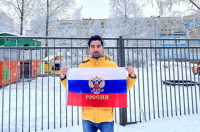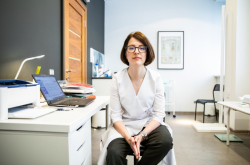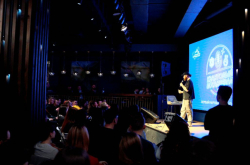The “Edible Science” course consisted of ten lectures that alternated between theory and practice. Ilya Litvyak began the course by educating the listeners on why scientific approach gives advantage to a professional as opposed to someone who sticks to unconscious mechanical work and does not understand the nature of processes. As part of the theoretical course, participants learned about the history of culinary art and the various world-class gurusworking in thisfield. Among the latter were the names of Harold McGee (the chief inspiration for most science-based culinary experts) and J. Kenji López-Alt (author of the best-selling culinary book “The Food Lab” that explains how to use scientific methods in home cooking).
“My intention was to set up the course in such a way that it would be in equal parts about science as a whole, about its use in cooking and about the joys of curiosity. The course is for those who don’t yet have a technical understanding of culinary processes. I’m convinced that it’s easy to learn these things – practice shows that one simply needs to get the hang of 5 or 6 basic principles and start applying them in life,” shares Ilya Litvyak.
A part of the course was dedicated to debunking cooking myths. One of them is thewell-known myth about searing meat to seal in its juices. Technological development has allowed participants to learn how these processes really work. They also talked about the fast pace of the industry in which researchand theories that have only been around for 20 years are already outdated and need to be reworked or rejected. A separate discussion was about the illnesses and infections one can fall to from various types of food.
“I’m taking this course because I want to get into innovative dairy production. I read a lot about dairy and dairy microorganisms and I think it’s a promising field. Perhaps people will learn to treat diseasesusing lactoproteins and sustain themselves with mega-nutritional mixtures. I’d love to play a part in making that a reality. I’ve already finished two years ofa “Food Production Technologies” course at a different university, but I’m interested in the innovative side of this, which is why I’m planning to transfer to ITMO University after completing this course” says Anastasia Smolyarova.
The course was divided into three thematic parts. The first, “Meat”, included a lecture on aging meat as a method of improving its properties. The second part was “Vegetables”, in which particular attention was paid to the potato: the participants learned the five steps to making perfect French fries, boiled potatoes in various solutions and discussed the plant’s color, texture, composition and reactions to various stimuli. This new knowledge allowed them to perform several experiments, such as changing the potato’s color,and helped them understand why certain breeds of this root plant vary in color. And, lastly, the students familiarized themselves with modernist cuisine. The first thing they learned was that it should never be referred to as “molecular”.
“Lessons would alternate between theory and practice. During the last session we had about 30 minutes of theory and a lot of practice. That usually meant preparing food – cooking particular ingredients and the dish as a whole. We had the general idea of how, scientifically, everything worked. Putting it into practice was a very interesting experience.” say Ilya Martynov and Agata Vanieva, students at St. Petersburg College of Tourism and Hospitality.
A part of the course was dedicated to the use of microorganisms in food technologies. One of the topics, for instance, was the Japanese “national” fungus, Koji, that is being used nowadays in Scandinavia and America to prepare food that does not traditionally require the application of fungus (such as aged steaks). This topic also touched on the technology that uses fungus-treated rice to accelerate the aging of meat.
Mr. Litvyak proposed to the aspiring biotechnologists to choose bacteria as a future cross-disciplinary field of study and told them of the current achievements in the field. He spoke, in particular, about the CRISPR/Cas9 technology of direct DNA modification that is based on bacterial immune systems. This technology has allowed scientists to cure a living organism – a rat – of HIV. It is also used to modify bacteria in such ways as to make them produce certain substances that cannot be obtained through any other means. According to Mr. Litvyak, this is a huge, underexplored and highly promising area of scientific knowledge. Another cross-disciplinary technology that was discussed is the electronic device that imitates various flavors.
Where does one learn about modernist cuisine? As Ilya Litvyak explains, there is only one restaurant in possession of a rotary vacuum evaporator (a favored appliance of modernist chefs) in St. Petersburg, so the only place where you could try a modernist dish prepared in such manner is the laboratory at ITMO University.
“Right now we’re awaiting feedback from the course’s students. The next course might be set up in MOOC (massive open online course) format and offered in English so that we could propagate the idea of scientific cooking to a wider audience,” shares Ilya Litvyak.
Edible Science Summer School and Foodlab
A summer school is now being developed in cooperation with this course’s participants, and is expected to start this summer. The school would be open to anyone interested in attending. The topics and schedule are currently in development, but the format is already known – the summer school will be a crash course in a certain discipline within the context of the “Edible Science” course. Each participant will complete their own project, the aim of which they will determine themselves according to their preference. The organizers will also show the participants around ITMO University’s laboratories and departments.
Unlike the Summer school, Foodlab is a much more lengthy undertaking, one in which students will work on a project together with ITMO University Master’s and PhDstudents. As of now, one can take part in “Foodlab” without attending the basic course of “Edible Science”, but soon only those who have graduated from the course with a completed project will be accepted. The current plan is to have two or three projects for which students will have to separate into groups. The project’s goal can be proposed by the students or picked from a list composed by the organizers. Ilya Litvyak has offered the course’s graduates to experiment with gluten-free food, as such a project could develop into a full-fledgedventure (there is only one place in the world today where appetizing gluten-free pasta is made). “Foodlab” will begin its work this autumn. By that time, those who applied to participate will need to form teams and begin working out their project topics.





